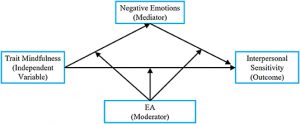Mindfulness is Associated with Improved Mood and Lower Interpersonal Sensitivity
By John M. de Castro, Ph.D.
“Mindfulness training may help reduce interpersonal sensitivity in college students. When college students have strong effectiveness/authenticity, lower negative emotions may be a protective factor to prevent interpersonal sensitivity.” – Xiaoqian Ding
Humans are social animals. This is a great asset for the species as the effort of the individual is amplified by cooperation. In primitive times, this cooperation was essential for survival. But in modern times it is also essential, not for survival but rather for making a living and for the happiness of the individual. Mindfulness has been found to increase prosocial emotions such as compassion, and empathy and prosocial behaviors such as altruism. So, being mindful socially is very important.
The importance of social interactions, however, can increase a person’s interpersonal sensitivity. This is associated with low self-esteem and a poor self-concept. At extremes, this can result in social anxiety disorders. Mindfulness training has been shown to help with the treatment of social anxiety disorders and to improve self-esteem. So, mindfulness may be effective in reducing interpersonal sensitivity. But there is little research on mindfulness and interpersonal sensitivity.
In today’s Research News article “Exploring the Relationship Between Trait Mindfulness and Interpersonal Sensitivity for Chinese College Students: The Mediating Role of Negative Emotions and Moderating Role of Effectiveness/Authenticity.” (See summary below or view the full text of the study at: https://www.frontiersin.org/articles/10.3389/fpsyg.2021.624340/full?utm_source=F-AAE&utm_medium=EMLF&utm_campaign=MRK_1616048_69_Psycho_20210504_arts_A ) Ding and colleagues recruited college students and had them complete measures of mindfulness, mood states, mental health symptoms, interpersonal sensitivity, emotional effectiveness/authenticity, emotional novelty, and emotional preparedness.
They found that the higher the levels of mindfulness the higher the levels of emotional effectiveness/authenticity and emotional preparedness and the lower the levels of negative emotions and interpersonal sensitivity. A mediation analysis revealed that mindfulness was negatively associated with interpersonal sensitivity directly and also indirectly by being associated with lower negative emotions which in turn was associated with lower interpersonal sensitivity. Finally, they found that the mindfulness’ association with lower negative emotions and in turn lower interpersonal sensitivity was stronger when the participants were also high in emotional effectiveness/authenticity.
These findings are correlational and as such causation cannot be determined. In prior research, however, mindfulness training has been shown to decrease negative emotions. So, the observed relationship is likely due to a causal relationship between mindfulness and lower negative emotions. In addition, mindfulness has been shown to improve self-esteem and the self-concept. Hence, mindfulness improves mood and lowers emotional sensitivity.
Interpersonal sensitivity is a problem for everyone and especially college students. It suggests that the individual doesn’t think much of themselves and looks at themselves as a problem. This can produce maladaptive behaviors on the part of the individual compounding the problem. Negative emotions feed into this negative self-concept. But this can be disrupted by mindfulness which not only improves the self-concept, reducing interpersonal sensitivity, but also improves emotions that also lower this sensitivity. This all suggests that mindfulness training may be recommended for college students to improve their psychological health.
So, mindfulness is associated with improved mood and lower interpersonal sensitivity.
“Mindfulness meditation could provide a healthy method of coping with interpersonal stress for college students and offer a valuable addition to traditional relaxation and imagery techniques.” – Lily Preer
CMCS – Center for Mindfulness and Contemplative Studies
This and other Contemplative Studies posts are also available on Google+ https://plus.google.com/106784388191201299496/posts and on Twitter @MindfulResearch
Study Summary
Ding X, Zhao T, Li X, Yang Z and Tang Y-Y (2021) Exploring the Relationship Between Trait Mindfulness and Interpersonal Sensitivity for Chinese College Students: The Mediating Role of Negative Emotions and Moderating Role of Effectiveness/Authenticity. Front. Psychol. 12:624340. doi: 10.3389/fpsyg.2021.624340
Background: Interpersonal sensitivity is a prominent mental health problem facing college students today. Trait mindfulness is a potential positive factor that may influence interpersonal relationships. However, the precise relationship between trait mindfulness and interpersonal sensitivity remains elusive, which limits the optimization and further application of mindfulness-based intervention schemes targeting interpersonal sensitivity. This study aimed to explore (a) whether negative emotions mediate the relationship between trait mindfulness and interpersonal sensitivity and (b) whether the relationship among trait mindfulness, negative emotions, and interpersonal sensitivity is moderated by effectiveness/authenticity. We hypothesize that (a) negative emotions mediate the relationship between trait mindfulness and interpersonal sensitivity, and (b) effectiveness/authenticity moderates the indirect association between trait mindfulness and interpersonal sensitivity through negative emotions.
Methods: One thousand four hundred nineteen Chinese college students (1,023 females, 396 males), aged from 17 to 23 (SD = 0.86, mean = 18.38), participated in this study. Their trait mindfulness, negative emotions, the effectiveness/authenticity, and interpersonal sensitivity were measured using well-validated self-report questionnaires.
Results: Correlational analyses indicated that both trait mindfulness and effectiveness/authenticity were significantly and negatively associated with interpersonal sensitivity. Mediation analyses uncovered a partial mediating role of negative emotions in the relationship between trait mindfulness and interpersonal sensitivity. Moderated mediation analyses showed that in college students with high effectiveness/authenticity, the relationship between trait mindfulness and negative emotions was stronger, whereas the relationship between negative emotions and interpersonal sensitivity was weaker.
Conclusion: Negative emotion is a mediator of the relationship between trait mindfulness and interpersonal sensitivity, which in turn is moderated by effectiveness/authenticity. These findings suggest a potential mechanism through which trait mindfulness influences interpersonal sensitivity. Mindfulness-based interventions have the potential to decrease interpersonal sensitivity and offer a basis for predicting individual differences in response to mindfulness-based interventions among individuals.
